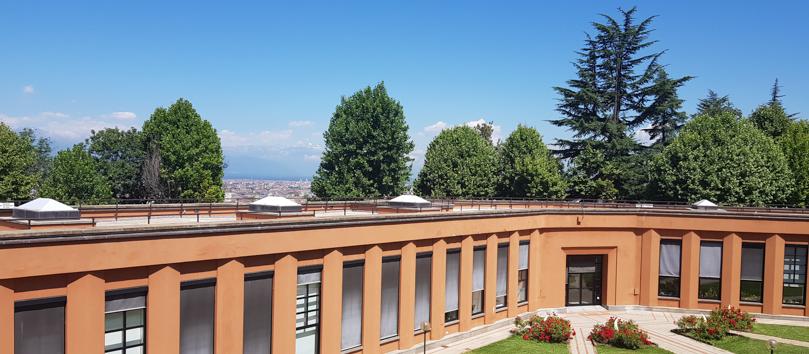
The greening of the European Training Foundation
Although the ETF is at the cutting edge of the green transition, helping educational providers identify and teach green skills, for the last five years it has also been analysing and improving its own environmental impact.
In 2019, the ETF decided to implement an EMS (environmental management system) and started to monitor its CO2 equivalent emissions. A group of around 10 volunteers from within the organisation formed the EMAS Project Team (EMAS is the EU's flagship Eco-Management and Audit System).
Led by the ETF's Renata Vallome, the team started working on an Environmental Policy and drafted the Terms of Reference for hiring consultants to support the adoption of the EMS and the preparation for registration. The group now meets once a month, with various sub-groups working on specific aspects of ETF ecological credentials.

"We started the project when Greta Thunberg was waking people up. She was so young, and touched a deeper place than politicians could. Within the ETF various people were worried about the future of our planet, about climate change but also about our own CO2 emissions. And we had a director, Cesare Onestini, who was very keen to ride the wave and push this project."
There were many challenges. Although there was a desire to concentrate immediately on concrete remedies, there was a major amount of administrative work:
"We had to conduct an internal audit and implement an EMS," adds Vallome, "to map all procedures, documents and legislation, and to have a baseline to monitor our environmental performance. Only then could we begin to intervene."
The ETF was registered for both EMAS and ISO 14001 (the internationally recognised standard for environmental management systems) in 2021.
"Every year we have a specific audit looking at everything we're doing, checking the way we manage waste, the preparedness of the building, the compliance part."
"It's quite intense," Vallome smiles, "they are rightly looking in-depth at the situation and thanks to confrontation with auditors and their recommendations, we manage to continuously improve our system and our performance."
But it's work which is paying off. In the last four years, the ETF has reduced its CO2 equivalent emissions by almost 40%, from around 1,000 tons per annum to 602. Those emissions were mostly reduced by concentrating on energy consumption:
"We didn't change suppliers, but carefully managed the heating times, changed all the light-bulbs, reduced night-lights which were superfluous and the number of in-house servers..."
A recent pie-chart showing the source of the ETF's 2023 emissions indicates that half of CO2 equivalent pollutants are the result of conferences and overseas missions.
"Travel is something we cannot not do," Vallome admits. "Travel and networking in partner countries are very important, we travel a lot to meet stakeholders and so on. But we need to come up with a proposal to make these missions greener without touching the budget: taking direct flights instead of stopovers, using public transport where possible."
Another opportunity to reduce emissions is in the commuting habits of ETF staff. Vallome and her team have conducted two surveys about staff mobility but know it's not easy to square the commuting circle:
"There's only one bus, but we're investigating alternative possibilities like car-pooling and charging docks for electric bikes and vehicles."
The office space itself also presents challenges as the shape of ETF building is quite strange, with offices distributed along a corridor and two towers.
"In the past we've proposed closing part of the building to avoid having to heat up and light that part, to push for hot-desking, but the general opinion wasn't favourable. People consider their own office part of their habitat and find it difficult to leave their own space…"
"The biggest challenge is trying to change people’s behaviour. It requires both courage and a thick-skin. We're not afraid to be unpopular. When we decided to eliminate plastic bottles and replace them with water fountains, not everybody was happy. It was the same when we decided to have lower temperatures. You have to be bold enough to go for it, despite the negative reactions of people around you."
The ETF's building is now closed for part of August when many people (including cleaning, maintenance and canteen contractors) are absent and when air-conditioning costs, and emissions are very high. That closure has been extended to the first week of January, when staff often have children at home from school. That, too, reduces energy consumption and the associated emissions.
With the renewal of the EMAS registration this year, the ETF is taking another big step by enlarging the focus on sustainability. To mark this change, also the name of the project team has been changed to GEMS (Green Environment and Management for Sustainability).
“We have adopted a new Environmental Policy,” says Renata, “drawing inspiration from the commitments and objectives defined by the European Commission to contribute to the achievement of common and shared objectives on a path towards sustainability. An EU commitment which had an important impact on the strategic choices of European agencies is the EU commitment to be carbon neutral by 2050.”
GEMS sub-groups are also exploring the optimisation of resources, using greener utility companies, reinforcing the waste management system and looking at the installation of solar panels. The latter, in particular, requires significant infrastructural investment which, quite apart from the economic challenge, isn't always a convincing proposition considering the duration of the rental period.
The greening of public procurement is another area under examination.
"There's a toolkit for green procurement," says Renata, "and we're proposing the inclusion of a sustainability aspect in all tenders. In an ideal world, we would be able to impact society by designing the terms of reference and encouraging the market to harmonise with our requests..."
The ambition to "walk the walk" means Renata hasn't shied away from tough decisions. One of GEMS' sub-groups is considering to transition from the current calculation of emissions (using LCA, or life-cycle assessment) to the GHG (greenhouse gases) protocol. GHG's scope 3 calculations include all the value chain, both upstream and downstream, so the change is likely to reveal previously hidden emissions for which the ETF is, indirectly, responsible.
"We have to thank Pilvi Torsti, our current director, and management for their continuing support. They have always been engaged with this project, and this has been fundamental for its success. It means we have been able to make a big difference in diminishing our emissions. And their support will be far more important in this new phase, because moving from carbon reduction to actual carbon neutrality, eliminating that remaining 50%, is really quite tough," Vallome concludes.
Did you like this article? If you would like to be notified when new content like this is published, subscribe to receive our email alerts.